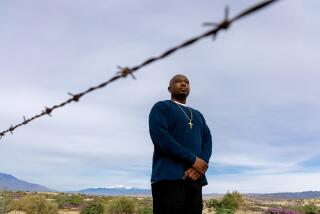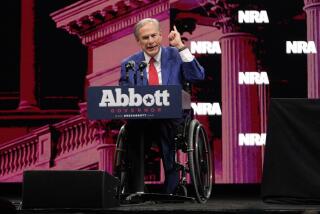Wilder Rejects Plea to Halt Controversial Execution
- Share via
WASHINGTON — Convicted murderer Roger Keith Coleman moved a step closer to the electric chair Monday when Virginia Gov. L. Douglas Wilder rejected his plea for a pardon.
“I have not been convinced he is innocent,” Wilder said after what he called an “exhaustive review” of the evidence.
Wilder, himself a former criminal defense lawyer, had been considered Coleman’s best hope for avoiding a scheduled Wednesday evening execution. Wilder had earlier commuted death sentences in two other cases, and Coleman’s lawyers hoped an accumulation of new evidence would cause the governor to doubt the young coal miner’s guilt.
Now Coleman’s last hope rests with the U.S. Supreme Court, which has refused of late to halt pending executions.
“I’m an innocent man waiting to die in two days,” Coleman said Monday morning when interviewed on ABC-TV’s “Good Morning America” program. “That’s very hard to come to terms with.” he added.
The case has drawn renewed national attention to the death penalty because Coleman’s lawyers have turned up new facts that some believe raise questions about his guilt.
In 1982, a jury in Grundy, Va., found Coleman, then 23, guilty of raping and murdering his sister-in-law, Wanda McCoy. The Virginia Supreme Court described the evidence against him as “entirely circumstantial” but nonetheless convincing.
No one saw Coleman or his pickup truck near the McCoy home on the evening of the murder, and no fingerprints or other evidence put him at the scene of the crime. But blood tests, hair samples and Coleman’s earlier conviction for an attempted rape convinced jurors that he was responsible for the murder.
Coleman has maintained his innocence, and his lawyers have recently presented the courts with affidavits from four people in Grundy who say another man, who lived in the house nearest the McCoys, spoke of committing the murder.
Last week, U.S. District Judge Glen W. Williams rejected a bid for a hearing on the new evidence, ruling that the affidavits do not demonstrate Coleman’s “actual innocence” of the crime. On Monday afternoon, the U.S. 4th Circuit Court of Appeals in Richmond, Va., also turned down Coleman’s appeal.
More to Read
Sign up for Essential California
The most important California stories and recommendations in your inbox every morning.
You may occasionally receive promotional content from the Los Angeles Times.














